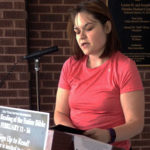- The Explore the Bible lesson for Jan. 26 focuses on Deuteronomy 4:1-9.
One Sunday morning, I received a text message from the fourth and fifth grade Sunday school teacher. The teacher was sick and asked if I could teach the class. I agreed, not knowing what I was getting myself into.
After the large-group session, the class broke into small groups. I called my class and went in to our classroom. This is where the chaos began. The children began to talk, run and hit each other regardless of my presence. Exasperated, I tried to regain control of the class but it was too late. I raised my voice loud enough so they could hear me and asked them, “Can you listen and follow my instructions?”
They looked at me. For a moment, I thought I had won the battle, but I was so wrong.
Sometimes I wonder: Is this how God feels every time he tells us something, through his word or by other means, and we do not listen? This is a call-to-action lesson. God invites us to listen and honor him so we can teach others about his blessing and wonders.
Listen (Deuteronomy 4:1-5)
Moses commands the people of Israel to obey God and his laws. But before they are able to obey, they must listen to God’s commands. Moses begins this section by calling the people to action; that is, he calls on them to listen. Moses invites the Israelites to leave their daily routines and gather together in order to hear a message that can drastically change the course of their lives.
Moses simply retold what happened at Baal Peor. Some people were destroyed because they worshiped the Baal. Others, who remained faithful to the Lord, were still alive. This has been the pattern in the books of Numbers and Deuteronomy—listen, follow and obey.
As leaders, pastors or teachers, this is our responsibility before the Lord—to encourage others to listen, follow and obey God’s word and commands. Jesus followed the same outline with his disciples. They listened, followed and obeyed God’s command. Paul, in his first letter to Timothy, encouraged him with these words: “My son Timothy, I am giving you this command … by remembering them, you can fight the battle well (1 Timothy 1:18). The only way we can follow and obey God’s command is by listening.
Honor (Deuteronomy 4:6-8)
The first reaction that came to mind after reading this section was that it’s an invitation to boast and brag about your God. Moses understood the importance of following the commands. He knew that if the nations looked at the behavior of the Israelites, they would be convinced there was a God superior to theirs. Imagine living in a lawlessness world and your God commands you to behave as wise and understanding people. That was certainly a culture-shock for many.
In verse 7, Moses made an intimate comment. He told the people God is nearby every time they pray to him. Consequently, he challenged them with a question, “What other nation is great enough to have its gods that close to them?”
Sign up for our weekly edition and get all our headlines in your inbox on Thursdays
God wanted them to feel proud of serving and following a God who was close to them every time they needed him. This section reminded me of my kids when they were in preschool. They were so proud of me as their dad that they would tell their friends, “That’s my dad!” God wanted the Israelites to feel the same way about him:“That’s my God!”
Teach (Deuteronomy 4:9)
This last section is a picture of what could happen if the people keep the commands alive. Moses warns them to not be careless and to “keep their soul diligently” (ESV). He also encouraged them to keep alive the things their eyes have seen as long as they live. The purpose of keeping these wonders active in their minds was to teach them to their children and their children after them.
It is important to keep these commands in mind. We need to be mindful to teach future generations about God’s wonders and love. Failing to do this can bring destructive consequences.
In his second letter to Timothy, Paul wrote: “I remember your honest faith and true faith. It was alive first in your grandmother Lois and in your mother Eunice. And I am certain that it is now alive in you also (2 Timothy 1:5).” Timothy’s faith was the end result of the commands given by God to the people long time before he was even born.
As leaders, teachers, parents, and followers of Christ, we have an immense challenge before us to teach the future generations to keep alive one’s own memory of God’s presence, guidance and blessings. What are you doing to teach the future generations about God?
Jaime Cortez is discipleship pastor at First Baptist Church in Athens, Texas.














We seek to connect God’s story and God’s people around the world. To learn more about God’s story, click here.
Send comments and feedback to Eric Black, our editor. For comments to be published, please specify “letter to the editor.” Maximum length for publication is 300 words.